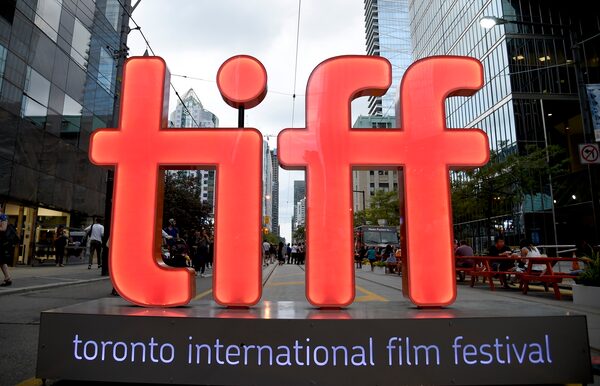
A TIFF festival sign in downtown Toronto, on Sept. 6, 2018.Chris Pizzello/The Associated Press
Jeff Justiz all but swore off the Toronto International Film Festival earlier this month after seeing the event hadn’t included proof of COVID-19 vaccination among its safety protocols.
When organizers announced an update to their rules Monday, Justiz was relieved.
Audience, staff and visitors will need to show proof of full vaccination or provide a negative test taken within 48 hours of entering festival venues for the Sept. 9 to 18 shows, TIFF says.
Justiz, a regular TIFF attendee since 2009, says he feels more peace of mind with a vaccine mandate in place at the festival, and he’ll likely purchase tickets to some of the screenings after they go on sale Tuesday.
“There’s a whole bunch of reasons I wouldn’t want to be in a room with people who are unwilling to be vaccinated,” the 39-year-old from Toronto said.
“Now I’ll feel safer and can enjoy a movie better knowing that people in the theatre care more about other people.”
TIFF protocols announced earlier this month said proof of vaccination for staff, talent and media would not be required to enter festival grounds, but individuals would have to undergo testing every 48 hours and wear masks at all indoor venues.
The testing requirement remains for those groups, TIFF’s website indicated Monday, and other precautions are still in place, including mobile tickets instead of printed passes, no rush ticketing or indoor lineups, no concessions sold at indoor venues and physically distanced seating in theatres
The vaccination rules for audience members don’t apply to outdoor drive-in venues, TIFF said.
Justiz said he wasn’t surprised to see TIFF release new requirements for the hybrid movie marathon, set to feature both in-person and virtual events.
“The winds are blowing this way,” he said. “It seems like they made that first announcement too prematurely and a lot of people disagreed. Then they had to play catch up.”
Toronto’s Jesse Taylor, another TIFF devotee, said in an interview last week he was disappointed festival organizers hadn’t included vaccination proof in their COVID-19 protocols.
Taylor said Monday he’ll still likely skip this year’s event as COVID-19 cases rise and the more transmissible Delta variant breeds more concern, but the newly announced policy was “good news for sure.”
“Personally I’m still maybe just not comfortable with the idea of being in a theatre, at least not yet,” Taylor said, adding that he’ll take in as many virtual screenings as he can.
“I’m fully vaccinated, and I know if I do contract COVID I should be better off than someone who’s unvaccinated, but I still don’t want to be sick. I don’t want to play with fire.”
Hilary Bergsieker, an associate professor of sociology at the University of Waterloo, says more and more event organizers are seeing that sentiment among their customer base, and there’s a level of trust-building that needs to happen before people feel comfortable attending large, indoor events again.
For some, mandating vaccination offers peace of mind, she said. But it can also serve as incentive to increase immunization rates, and Bergsieker said we’re likely to see more vaccine or testing requirements for other events.
Sports teams and stadium venues have already started to endorse proof of vaccination for entry, including the Toronto Blue Jays, who announced Monday new policies for fans and staff beginning mid-September.
Toronto-based Maple Leaf Sports & Entertainment – which owns the NHL’s Maple Leafs, NBA’s Raptors, CFL’s Argonauts and Toronto FC of Major League Soccer among other teams – said earlier this month it will require proof of vaccination or a negative test for entry into its facilities.
TIFF also isn’t the first film festival to announce a vaccine requirement for audience members. The Telluride Film Festival in Colorado and the Venice Film Festival, both of which start early next month, have mandated vaccination proof or a negative test for entry while Sundance, which doesn’t begin until January, 2022, announced similar protocols.
“There’s absolutely been a sea change in both the U.S. and Canadian leadership in about the last six weeks,” Bergsieker said in a recent interview. “I think that’s largely in response to Delta and recognizing that we weren’t going to get to the [vaccination] levels we need to end this pandemic.
“So it looks like leaders are realizing you actually need some rules and regulation to strongly incentivize people to get vaccinated.”
Sign up for The Globe’s arts and lifestyle newsletters for more news, columns and advice in your inbox.